Share

Invisible Not Broken - Chronic Illness Podcast Network
A Bear, A Zombie Leg, Food Allergy, Morton's Neuroma, and Living the Spoonie Life
Meet my new co-host Kyros. He was one of the first friends I made when we moved. He and his husbands are the most loving and kind men you could ever hope to call friends. If you ever see Kyros you would know why he would be someone you would think to ask for help moving furniture before you would think to offer him a seat. After talking with Kyros about his food allergy which I had no idea how seriously and how long it could affect him and about his trouble with walking I will be doing things differently when he comes over. I will NOT make dry meringues. Here is a shameless plug for Kyros and his co author Orion Hunter's book. I hope you enjoy your time with my friend. Until next week Be kind. Be gentle. Be a badass.
Did you like what you just listened to?Thank you! If you enjoyed please help us here at Invisible Not Broken and share us with someone in your life. Sign up for the newletter for news and specials.
Email Address Sign UpWe respect your privacy.
Thank you! Links From The Podcast Kyros Invisible Illness QuestionnaireName: Kyros Starr
Age: 48
Disorder: Arthritis, Morton’s Neuroma, Dairy Allergy, Peripheral Neuropathy
Age disorder became a daily issue: A: 45, MN: 33, DA: 40, PN: 47
Who were you before your illness became debilitating?
I loved taking the dogs to the park, riding my bike everywhere. I worked 10 hours a day as a cable technician on my feet the whole time.
Is there anything you would do if you were not sick?
Ride my bike more, walk to the grocery store (It’s only 5 blocks away)
What should other people know about our daily life?
I’m in near-constant pain. A good day is about a 2/10, an average day is about 5/10. A bad day is 9/10.
What would make living and moving in the world easier for you?
Even sidewalks/pavement. Uneven ground makes my feet hurt more. Also, something other than concrete everywhere. Standing / walking on concrete is the worst. I can walk on grass / softer surfaces (even though they are uneven) for hours but I can only stand on concrete for about half an hour before I am in ever-increasing pain.
Life hacks?
Walk stools are your friend. You can wear it like a backpack then sling it off and have someplace to sit in a just two minutes. https://www.amazon.com/gp/product/B0015A8DVM/
Support from family or friends?
My partners are great, but they don’t always understand why I say I can’t do something. “You did it just fine yesterday,” is a common phrase. They finally started understanding better when I explained the concept of “spoons” to them. https://en.wikipedia.org/wiki/Spoon_theory
Do you find that people do not believe you are sick because of your appearance?
All the time. Especially the Dairy Allergy part. I have people tell me all the time that “Oh, I’m lactose-intolerant too. But I go ahead and have ice cream whenever I want. I just deal with the consequences.” I’m usually like, “If I did that, I would be running to the bathroom with explosive diarrhea in about 30 minutes and would have exceedingly painful stomach cramps and gas for the next 3-4 days.”
How has this affected you positive or negative?
It’s caused me no amount of trouble when I eat out. I have waiters/cooks who don’t take me seriously or treat it like I’m just making it up. I once ordered a hamburger and they brought me a cheeseburger. I told them I couldn’t eat it. The waiter initially argued that I got the cheese for free because they only charged me for a hamburger. I reiterated that I couldn’t eat it. The waiter took it back and came back a few minutes later with the same burger with the cheese scraped off. I told them that if I ate that, I would still get sick. The waiter and the cook were both pissed at me, even though I told them upfront that I had a dairy allergy.
How has this affected your relationships?
My previous relationship refused to believe that I had anything wrong. I should just “tough” it out because everyone has things that hurt.
Any questions to add to this list?
Why do you think people don’t believe you when you say you have a disability?
What is the single greatest challenge you face on a daily basis?
How do you tell people that you have an invisible disability? Do you tell people?
Animals in the wild try to hide their disabilities because they will be preyed upon by other animals. Do you think that, on some level, that is why people with invisible disabilities try to hide their problems even from loved ones?
What are you afraid to tell even the people closest to you?
That I usually burn through my daily allotment of spoons right before or during cooking dinner, but I feel I have to push through anyway because the family is depending on me to take care of things. The fact that I usually end up cleaning up dinner and doing other things around the house afterward means I am frequently beyond exhausted by the time I go to bed.
Definitely. I have had to do my own research into what’s wrong with me on more than one instance. It was only because I pushed that I got the test/treatment I needed. For example, I found out about and performed the elimination diet to find out what was making me sick (dairy), not my doctor.
Best coping mechanism?
I do the shopping. That way I can ensure that I read the labels and not accidentally get something that contains hidden dairy. As far as my feet and arthritis problems, I’m lucky enough that we can afford for me to get weekly massages that help with the pain.
Favorite swear word?
Fuck! Or Motherfucker.
What are you the most fearful of and what are you the most hopeful for in the future?
I’m fearful that my condition will continue to deteriorate to the point where I cannot walk at all without assistance. This would make life very difficult as my house has lots of stairs and I would not be able to take care of my family like I do now. I also would no longer feel like I was contributing to my family.
I’m hopeful that, with advances in medicine, something can be done about my various problems so that I can go back to having an active life where I don’t have to think about ‘how far can I realistically go / walk’ or that I can go out to eat without having a near panic attack worrying that there will be hidden dairy in my food that will make the next several days hell.
Support Kyros Dreaming of Xeres (The Third War Book 1) By Orion T. Hunter, Kyros Amphiptere Follow Us
More episodes
View all episodes
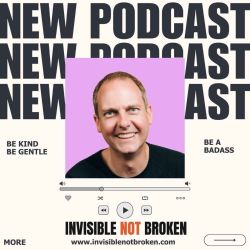
Vulnerability, Resiliency, and Advocacy with Tim Reitsma
47:06Monica Michelle is joined by consultant and podcast host Tim Reitma.Tim lives with Crohn's Disease.In this episode, Monica and Tim discuss: Tim’s resiliency through managing his Crohn’sThe importance of self-advocacy, especially in the workplace Tim’s podcast why he shares stories of those with invisible illness TIMESTAMPS00:47 - Tim's diagnosis 06:31 - How and why Tim applies self advocacy15:41 - Why Tim started his podcast22:42 - Invisible condition etiquette31:00 - What HR can do better for employees with invisible illness39:31 - Tools Tim uses to care for his Crohn’s outside the homeThe full transcript and all links mentioned can be found on the episode page on invisiblenotbroken.com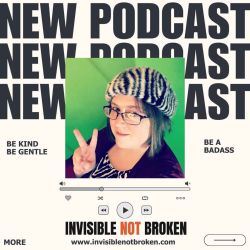
Tech and Disability: What VR Offers the Disabled Community with Sunny Ammerman
01:10:27Monica Michelle is joined by artist and disability advocate Sunny AmmermanSunny lives with Septo-optic dysplasia, panhypopituitarism, Optic Nerve Hypoplasia, and is missing a membrane in the brain called the "septum pellucidum".In this episode, Monica and Sunny discuss: Sunny’s complex disorders and how she copes with themEverything VR provides from accessible gaming, social platforms and the potential for better online education.Various VR/AR games and their gameplay Sunny’s VR support groupTIMESTAMPS00:45 - What VR/AR offers for chronically ill and disabled folks11:57 - Sunny’s conditions and how she copes with them17:55 - Features that make VR games accessible or inaccessible as well as different games and their play experiences37:13 - The social aspects of virtual gaming51:32 - What opportunities VR has for the future1:04:49 - Sunny’s VR support group The full transcript and all links mentioned can be found on the episode page on invisiblenotbroken.com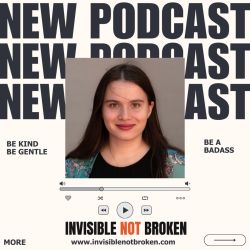
Reporting on Chronic Illness and Disability with Journalist Julia Metraux
39:16Monica Michelle is joined by Journalist Julia Metraux.Julia lives with vasculitis, mild to moderate hearing loss, and has experienced long COVID.In this episode, Monica and Julia discuss: Julia's diagnosis with vasculitis and how it influences her journalistic lensHow community impacts the mental health of those with chronic illnessHow Julia and Monica find positives and negatives in the internet spaces for chronically ill and disabled folksThe politics of how government, businesses, and celebrities influence the chronic illness community TIMESTAMPS00:32 - Julia's diagnostic journey07:02 - Julia’s work reporting on the online community of chronic illness 16:32 - The effect of Internet communities on chronically ill and disabled folks26:46 - How Julia’s illness impacts her work, both in what she writes about and how she manages her lifestyleThe full transcript and all links mentioned can be found on the episode page on invisiblenotbroken.com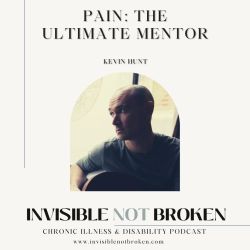
Author of “Pain: The Ultimate Mentor,” Physiotherapist Kevin Hunt
31:29Monica Michelle is joined by author & physiotherapist Kevin Hunt.Kevin lives with chronic pain.In this episode, Monica and Kevin discuss: Kevin’s philosophy of pain management as a physiotherapist who experiences chronic pain. The Hexagon Model, a life-management tool for focusing on what’s important to you.Kevin’s idea behind his new book.Using pain as a guide.TIMESTAMPS00:34 - Kevin’s work as a physiotherapist specializing in the experience of pain 06:44 - The Hexagon Model for managing your life’s needs14:00 - Putting aside the idea of a “quick fix”19:45 - Kevin’s personal experience with pain and how he uses it with patients28:44 - Kevin’s book, “Pain: The Ultimate Mentor”The full transcript and all links mentioned can be found on the episode page on invisiblenotbroken.com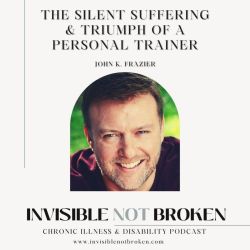
Author of “Through the Pain: The Silent Suffering & Triumph of a Personal Trainer”: John K. Frazier
28:35Monica Michelle is joined by author & personal trainer John K. Frazier.John lives with ankylosing spondylitis.In this episode, Monica and John discuss: John’s work as a physical trainer and authorChronic pain comparisonsPersonal triumphTIMESTAMPS00:50 - John’s business & diagnosis07:19 - Chronic pain olympics09:31 - Talking about & hiding a diagnosis15:09 - Personal triumph18:24 - Staying in the present23:29 - The superman complexThe full transcript and all links mentioned can be found on the episode page on invisiblenotbroken.com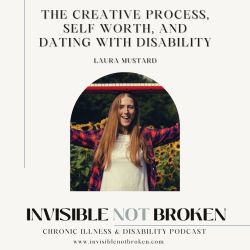
The Creative Process, Self Worth, and Dating with Disability: Laura Mustard
31:08Monica Michelle is joined by musician Laura Mustard.Laura lives with VATER syndrome.In this episode, Monica and Laura discuss: Laura’s inspiration for her upcoming musical EP.How Laura’s illness impacted her recent relationship & self-image.Laura’s creative process, new music, and social media pressure.TIMESTAMPS00:30 - Laura’s new EP / Monica’s recent COVID experience05:32 - Relationships with chronic illness11:20 - Image and self acceptance with disability15:32 - Laura’s creative process and current projects20:05 - Pursuing creativity despite social media attentionThe full transcript and all links mentioned can be found on the episode page on invisiblenotbroken.com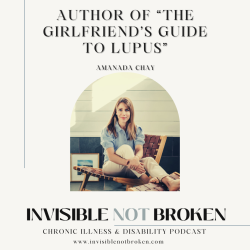
Author of “The Girlfriend’s Guide to Lupus”: Amanda Chay
30:43Monica Michelle is joined by author Amanda Chay.Amanda lives with Sjögren’s and Lupus.In this episode, Monica and Amanda discuss: Amanda’s book & diagnosisOutlooking on work & writingNavigating chronic illness with kids & familyTIMESTAMPS00:26 - Intro + The Girlfriend’s Guide to Lupus02:17 - Amanda’s diagnosis10:09 - Amanda’s outlook on writing17:11 - Navigating chronic illness with kids & family23:29 - Labels and roles26:24 - Flare reads & closing remarksThe full transcript and all links mentioned can be found on the episode page on invisiblenotbroken.com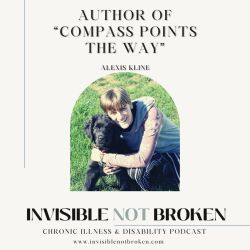
Author of “Compass Points the Way”: Alexis Kline
23:14Monica Michelle is joined by author Alexis Kline.Alexis lives with Dysautonomia.In this episode, Monica and Alexis discuss: Being a sick teenagerHaving an isolated diagnosisProductivity workflowsTIMESTAMPS00:28 - Alexis’s diagnosis & dog07:18 - Sick teenager road map10:00 - Alexis’s book & workflow16:25 - Having an isolated diagnosis20:50 - Wildlife photography, purchases The full transcript and all links mentioned can be found on the episode page on invisiblenotbroken.com
Author of “From the Sidelines to the Finish Line”: Emily Falcon
36:47Monica Michelle is joined by author Emily Falcon.Emily lives with ALCAPA.In this episode, Monica and Emily discuss: Growing up sickPost-surgery supportHaving a public bodySelf-motivation and adventuringTIMESTAMPS00:28 - Being a sick kid & Emily’s book title07:28 - Mortality10:16 - Portrayal of disability in media12:21 - Post-surgery support19:23 - Having a public body23:43 - Self-motivation29:46 - Emily’s tips for adventuresThe full transcript and all links mentioned can be found on the episode page on invisiblenotbroken.com